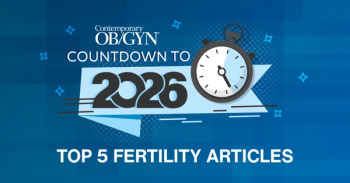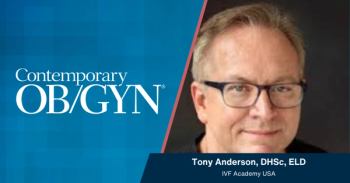
Forming New Chapters
OBGYN.net Conference CoverageFrom the International PCOSupport Conference and the Women’s Symposium on Polycystic Ovarian Syndrome - San Diego, CA - May 2000
Barbara Nesbitt: “Hi, this is Barbara Nesbitt, and I’m here in San Diego talking with Lisa Weinstein who is the Chapter Development Coordinator for New York and the whole northeast area. She’s a fellow Yankee, even though I live in Texas but anyway we are getting along very well because we both have our little Yankee accents. Lisa, first off tell me what a chapter development coordinator means in the PCOS Association.”
Lisa Weinstein: “In the PCOSA, chapter development coordinators are charged with the responsibility of recruiting chapter coordinators to develop and run chapters and bring them up to full chapter status and to mentor those people along the way, and in essence run their geographic region.”
Barbara Nesbitt: “You and I were chatting before this, so when you say develop it’s a lot more work then it sounds when you say it. You have to actually go out and activate people, get them interested, motivate them, help them, give them the confidence, and train them. Am I right?”
Lisa Weinstein: “Absolutely.”
Barbara Nesbitt: “So tell us the truth, you do a lot of work.”
Lisa Weinstein: “I do a lot of work. I work all day, I have my own practice which I’m also trying to grow, and then I go home at night and can spend anywhere from three to five hours working on PCOSA related matters.”
Barbara Nesbitt: “I don’t have PCOS but say I call you up or you bump into me somewhere and we get to talking. I tell you that I have PCOS and that I’m interested and I wish there was someplace for a support group or something. In our talking I show an interest in maybe getting something going in my area, what are you going to do with me?”
Lisa Weinstein: “I’m definitely going to recruit you. I’m going to spend some time talking to you and try and understand your motivation for starting the group to begin with. I’m going to get a sense of what your background outside of being a woman with PCOS is and what your experiences have been. I find that it’s very important for me to understand the frame of reference that a particular woman has with respect to PCOS. So that means that I’m going to find out when they were diagnosed, what kind of test work was done, and what their personal and emotional experiences have been with PCOS because the condition is a condition that affects every aspect of what a woman is.
There are the cosmetic issues of acne and hirsutism, and there are weight issues in many women although not all women with PCOS have weight problems. There are frequently mood issues, infertility issues, and all of these things attack the very essence of what western society tries to tell us a woman is supposed to be. So I’m going to try and understand where that person is coming from, what their frame of reference is, and also get an idea of what they do outside of being a woman with PCOS.
I want to know what talents they may have because, in essence, I want to be able to build on their strengths. Then I want to give them an idea of what they may expect and what the job is about because the worst thing that can happen is someone takes on the responsibility, gets something into infancy status, and then suddenly decides they can’t do it. Yet, they haven’t gotten to the point where there are enough other women involved that it’s easy to have somebody else take over.”
Barbara Nesbitt: “So that would be a failing, I don’t mean that you fail in it but it would be a failing on your part as the Chapter Development Coordinator to not make me fully aware of the areas where it would be difficult and time consuming until I get my feet wet so to speak.”
Lisa Weinstein: “I believe so, definitely.”
Barbara Nesbitt: “So that’s where it’s a big job for you, you have to be up front and honest and then also convince me after that that I still want to do it.”
Lisa Weinstein: “Exactly, and one of the important things I think is that the prospective coordinator understands that they may have questions. They may run into situations that I may not have experience with before or I may not have a suggestion or an answer for but we have a whole organization behind us. There are women all over this country that have worked in chapters that work at the national level as well. We will get an answer, and we will get a suggestion, all they have to do is ask. Developing a rapport with a particular woman is very important as well.”
Barbara Nesbitt: “Something that I noticed and I go to a lot of professional meetings, we have the forum from your Association now that we’re in collaboration together and it’s on OBGYN.net. I have noticed that your forum is a healthy, I say healthy mentally; it’s a healthy group of women that are truly and solely committed to helping each other. There’s very if ever anyone on there that’s doing any doctor bashing or doing any type of bashing. We have another forum; I will not name the condition, where they seem to run that way at times. I respect your people for that. At this meeting, I will tell you one of the strong things that has come to my mind is I respect all of the people that are here working with the Association but I respect greatly the women in the audience that have come here that are your members because they’re here to learn. They don’t have a chip on their shoulder.”
Lisa Weinstein: “You’re absolutely correct and, in fact, you’re not the only person who’s made that statement to me today.”
Barbara Nesbitt: “It’s a beautiful thing really.”
Lisa Weinstein: “Dr. Perloe, who is also associated with OBGYN.net, made the same statement to me that he is impressed at the fact that there isn’t doctor bashing going on. In truth, I hear a lot of “my physician this” and “my physician that” but this is an educational forum that’s taking place, and I think that it’s healthy for women to discuss their disappointment with their own physicians or the physicians in their area amongst other women or in private conversations with some of the physicians that are here.”
Barbara Nesbitt: “Yes, but we had a physician today and not the only one who stood up when somebody asked a question about some testing that they were having done, and I believe it was Dr. Steven Sawin, say, “Perhaps it’s time to find another doctor.”
Lisa Weinstein: “Absolutely.”
Barbara Nesbitt: “Those are the best words a good doctor can ever tell a woman. Don’t you think?”
Lisa Weinstein: “I think they are the best words that a doctor can tell a woman if it’s necessary, and I have also told many women that myself. But there’s another aspect we need to examine, not everyone lives in an area where there are physicians who are experts in PCOS.”
Barbara Nesbitt: “That’s absolutely correct.”
Lisa Weinstein: “Part of our responsibility as women with PCOS is to find physicians who may not know a lot about PCOS but are willing to learn and are willing to accept contact with some of the Medical Advisory Board of the PCOSA who can guide them in their treatment of women. It’s so important that we get the word out.”
Barbara Nesbitt: “That’s why the marriage of the PCOS Support Association with OBGYN.net and that collaboration that we have on, I’ll call it our PCOS Pavilion because you still have your own
Lisa Weinstein: “That’s one of great, great strengths of the website and also the partnering, I think, has opened up a tremendous amount of dialogue between members of the Editorial Advisory Board on the Pavilion as well, people who would not necessarily have met or would not necessarily be talking to one another. I think as a result of that, both organizations will gain in strength and in mission.”
Barbara Nesbitt: “I think you’re correct. There’s something I’d like to do, and I’d like you to write up something if you will, and I’m putting you on the spot here, or if you have it already in the organization, I think we should put something on the OBGYN.net PCOS Pavilion. Put it on the PCOS Pavilion where you could explain if anyone is interested in having a chapter in their area, if they think they might be interested in being the person to get up and do it, here’s some of the things that maybe they should have in mind of what they might have to do, and here’s who to contact to get the whole scoop. I think there’s women sitting around and they just don’t know what to do.”
Lisa Weinstein: “Speak to Kristin.”
Barbara Nesbitt: “Speak to Kristin, because we could just put a little place on there, if anyone’s interested in having a support group in their area, and just have something that clicks to somewhere.”
Lisa Weinstein: “I think a good place to have it click to is to hook into the area of our website where we essentially do that.”
Barbara Nesbitt: “I thank you, Lisa, for this and we’ll talk some more. We’ve got two more days here.”
Lisa Weinstein: “Very good, thank you.”
Visit the
Newsletter
Get the latest clinical updates, case studies, and expert commentary in obstetric and gynecologic care. Sign up now to stay informed.









